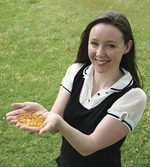The good oil: making a difference to premature babies
 Health Sciences Health Sciences
A researcher who has shown that the visual development of premature babies can be improved by ensuring their diets are rich in omega-3 oil has won this year's Young Investigator Award. Dr Lisa Smithers won the $10,000 the Hon. Carolyn Pickles prize and was named the South Australian Young Investigator for the Year at a ceremony at the Adelaide Convention Centre last month. Dr Smithers, who conducted her PhD research at the University of Adelaide and is now a Medical Scientist and Postdoctoral research fellow at the Women's and Children's Health Research Institute and Flinders Medical Centre, took out the award based on her ability to communicate her science to a panel of media judges. Dr Smithers conducted a clinical trial involving 143 babies born more than two months premature. As part of the clinical trial, tuna oil capsules containing DHA, an omega-3 oil, were ingested by breastfeeding mothers and DHA was also added to milk formula for those women not breastfeeding. Throughout pregnancy DHA usually accumulates in the growing baby's brain and visual system. DHA is normally present in breast milk and formula, but these supply lower amounts than provided to a growing baby during a full-term pregnancy. The clinical trial raised the DHA levels in the milk to four times higher than what would normally be present, to an amount similar to that supplied during pregnancy. The DHA-enriched milk was provided to the premature babies until their full-term date. No differences in vision were found at two months of age, but by four months, babies who were fed higher DHA could see a finer pattern than those fed the usual amount of DHA. The research findings have the potential to help improve the health outcomes of babies born prematurely, who have a life-long, increased risk of poorer development. "Babies born prematurely today have a greater chance of survival because of advances in medical care, but they have an increased risk of medical and developmental problems," Dr Smithers said. "As humans, we learn so much about our environment through our vision, so there is a realistic potential for this to improve other important areas of the babies' development." As part of her research Dr Smithers also devised a visual testing procedure for babies based on international methods. This involved monitoring brain waves through sensors as the babies responded to patterns displayed on a TV monitor. The patterns were reduced in size until there was no response, indicating that the baby could no longer see the pattern. Babies were tested at two and four months of age because a baby's visual system is in rapid development following birth. The Young Investigator Award, now in its ninth year, is a highly successful event rewarding excellence in South Australia's young researchers in both science and their ability to communicate and "sell" that science. The award is an initiative of the Children, Youth and Women's Health Service, in conjunction with the University of Adelaide, the University of South Australia and Flinders University, together with the Women's and Children's Health Research Institute and the Women's and Children's Hospital Foundation.
|





